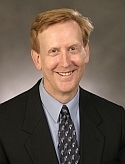by
Brendon Nafziger, DOTmed News Associate Editor | November 28, 2012
A number of years ago, while interpreting a head CT scan of an 89-year-old man who had a bad fall and a history of dementia, Dr. Richard B. Gunderman, then a young resident, simply noted widespread subdermal hematomas, and moved on to other studies. But he missed something: not on the CT scan, but what lay behind it, he said. His patient, who now had trouble crossing a room without tripping over, was in fact Charles Huggins, the winner of the Nobel prize in 1966 for his discovery of the role hormones play in prostate cancer.
In his RSNA 2012 annual oration in diagnostic radiology, Gunderman mentioned his encounter with the late University of Chicago urologist as an example of how radiologists can sometimes pursue efficiency and precision while forgetting the humanity of their patients, and how a good story can bring it back.
"We can be extraordinarily precise and utterly inaccurate," he said in the talk, given Tuesday afternoon in the cavernous Arie Crown Theater at McCormick Place. "We can get the little things right and completely neglect what matters most."



Ad Statistics
Times Displayed: 120335
Times Visited: 6922 MIT labs, experts in Multi-Vendor component level repair of: MRI Coils, RF amplifiers, Gradient Amplifiers Contrast Media Injectors. System repairs, sub-assembly repairs, component level repairs, refurbish/calibrate. info@mitlabsusa.com/+1 (305) 470-8013
Gunderman, unusually a professor of radiology, pediatrics and medical education as well as philosophy, liberal arts and philanthropy at Indiana University, speculated that alienation from patients and a data-only focus could be one of the drivers that lead to higher burnout rates for radiologists than for some other medical specialists. (An Annals of Internal Medicine study published in October found radiologists had above average risk for burnout, although it also found they reported a rather happy work-life balance compared to their non-radiologist peers.)
Gunderman also said many at RSNA will spend their time thinking about new equipment, bemoaning cuts in the budget, fretting over job security or measuring success by publications and awards, when they should spend more time "storytelling" — that is, telling their colleagues, residents or junior partners about times when they felt proud of being a radiologist, to remind themselves of the profession's human value.
"I knew a lot about [Huggins'] biology from that head CT scan but I knew precious little about his biography," he recalled.

